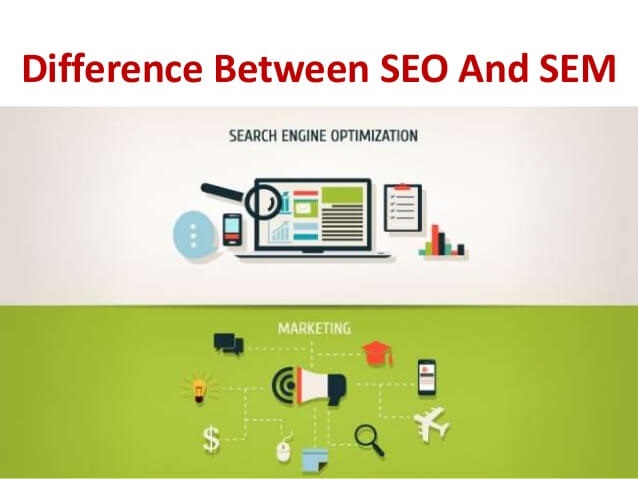
Hey, do you want to know the Difference Between SEO and SEM? If yes, then you are in the right place. In this article, I will explain the Difference Between SEO and SEM.
The subject of ‘traffic’ has always been a constant one in the online business space. In today’s dispensation, if you are not doing anything to drive traffic to your website, it is another way of knowing that you are not prepared for the competition. Hence, if you want to be successful in this business, you cannot stop strategizing on how to increase traffic to your web pages.
Consequently, the two biggest talking points regarding traffic have always been SEO and SEM. It would help if you were clear on what they mean and how they can be useful to you in your attempt to seem relevant to your target audience.
This article will explain these terms and how they differ from one another.
So, without wasting more time, let’s start.
Difference Between SEO And SEM
When these terms were first introduced, SEO was known as Search Engine Optimization, while SEM was known as Search Engine Marketing. In the search world, SEO was understood as a component of SEM.
SEO has to do with how websites are optimized so they can get a better ranking in the eyes of the search engines. On the other hand, SEM was judged to be a collection of the different strategies used for driving traffic to your website.
While that was how both terms were defined, there is now a newer version of how SEO and SEM are defined today. In today’s digital marketing language, SEO is defined as an organic search strategy, and SEM is understood to be a paid search strategy. Let us dig a little deeper in the subsequent sections of this post.
An Overview Of Search Engine Optimization

SEO disciplines are expected to evolve constantly in order to align with Google’s dynamic algorithms. Businesses need to ensure their content is well in tune with what Google desires. The more SEO-friendly your content is, the more blessings you will receive from the Google search lords.
The two pillars of SEO are always going to revolve around on-site and off-site activities.
Here are some of the SEO’s on-page elements that you ought to be aware of:
- Optimization of metadata, which includes the art of writing a meta description, the page’s title tag, heading tag, as well as Alt tags for incorporating target keyword
- Optimized and well-written page, copy via proper keyword research
- Social sharing features inside your content
- Optimized page speed.
Some of the SEO off-page elements are:
- Link building for attracting and obtaining good quality inbound links (inbound links comprise the bulk of off-page elements)
- Social signals (for instance, using the share button on social media platforms to increase traffic to your website)
- Getting attraction from booking-making websites like Stumbleupon, Digg, and Reddit.
Create valuable, high-quality content that will be useful to your target audiences, such as articles, blogs, and web copies. This will help you establish your authority as time passes, leading to an increase in your organic traffic, additional opportunities for inbound links, and, the big one, higher conversions.
Focus on these off-page and on-page tactics to help make sure your web copy, blog posts, and landing pages are optimized for search engines.
An Overview Of Search Engine Marketing

SEM is all about becoming visible on search engines like Google through paid advertisements. These adverts are normally called pay-per-click ads or PPC. Other terminologies, such as cost-per-click ads (CPC), paid search advertising, or paid search ads, are also used to describe SEM.
PPC lets you target prospective buyers via relevant ad copy, as well as keywords that are based on their search query. PPC ads normally come up in SERPs and search engine result pages and are close to the organic listing. It affords you the privilege of boosting the visibility of your blog posts, articles, landing pages, web pages, and many more. If you are unfamiliar with the latest techniques and strategies, you should consider hiring a PPC marketing agency.
SEM Strategies
Google Adwords has been recognized as the most common search engine platform for hosting ads. You can also consider other options like Yahoo search ads or Bing ads. Whichever internet marketing technique you choose to spend your hard-earned money on, there are certain strategies you need to pay attention to if you want to be successful in SEM. Listed below are some of those strategies.
- Trigger your ad campaigns with a certain audience in mind
- Create ad groups having variations of target keywords
- Craft relevant ad copy with those selected keywords
- Set your ad budget
- Closely track metrics such as impressions, clicks, average cost-per-clicks, and CTC (click through rates)
There are several other considerations when it comes to launching and maintaining a promising paid search ad campaign. However, as a beginner, you can get started with these. With SEM efforts, you are bound to make your SEO inputs more significant and effective.
Difference Between SEO And SEM: Which One Is Better?
Just like any normal argument, some people side with SEO while others are for SEM. The SEO fanatics believe that it is more effective. However, the SEM proponents have different opinions. However, some experts consider good SEO to be the basis for forming high-quality SEM strategies. The truth is that the two of them are crucial to your success as a business. You are required to make the components of whatever B2B inbound marketing strategy you are using.
Conclusion
In the end, SEM is search engine marketing, while SEO is search engine optimization. From the course of this post, you can tell that only a thin line separates both of them. SEO is good. SEM is also good. Whether one is a subset of the other, you need to be aware of the two of them to be able to make the most of them, which has been addressed in the post. One more thing: try to know when to make use of either strategy where necessary. That alone could make all the difference in your marketing efforts.
So, that’s all from this blog. I hope you get an idea about the difference between SEO and SEM. If you like this article, please share it with your friends.

